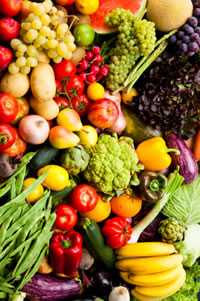Sustainable Food
Environmental Impacts of our Food System

Food impacts almost every component of our lives. The production, processing, packaging, and transportation of the majority of our food are highly dependent on the use of fossil fuels and chemical fertilizers. These can greatly harm our health and the health of the environment. In response, a move towards sustainable food has become an important component of public and environment health.
CDC envisions a food system that provides healthy, sustainable choices, minimizes environmental impacts, and serves as a model for the broader public health community. It is up to you, as a purchaser and consumer, to consider the impact of food from seed to table. Choosing local, healthy, environmentally responsible food helps promote personal health as well as the overall health of the community.
Plant good food thoughts, grow good food choices!
Sustainable food systems operate in a cycle of sustainable production and support. Farmers can make their food more sustainable by limiting pesticide use and treating their animals humanely and responsibly. Consumers can cast their votes for these healthier and more sustainable foods when they choose to support these farms. Choosing foods that are produced close to home also reduces the impact of our food system on the environment by reducing the distance food travels from farm to table.
Choose food that
- Does not harm the environment
- Supports and preserves rural communities
- Is healthy and nutritious to eat
- Respects farm animals
- Provides farmers with a fair wage
- Is free of added toxins
- Is grown in the local community
- Does not harm the health of farm workers
Related Links
- Page last reviewed: April 3, 2012
- Page last updated: April 3, 2012
- Content source:


 ShareCompartir
ShareCompartir